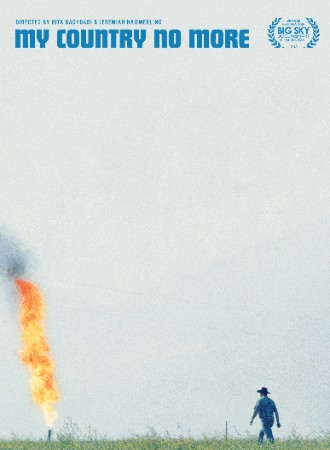
My Country No More 2017
Distributed by Bullfrog Films, PO Box 149, Oley, PA 19547; 800-543-FROG (3764)
Produced by Rita Baghdadi and Jeremiah Hammerling
Directed by Rita Baghdadi and Jeremiah Hammerling
Streaming, 70 mins
General Adult
Agriculture; Environmentalism; Social Movements
Date Entered: 04/21/2020
Reviewed by Daniel L. Thacker, Reference and Instruction Librarian, Penn State AltoonaThe documentary, My Country No More, follows the Rider family and some of the citizens of Williams County, North Dakota as they deal with being on top of one of the largest oil deposits in the world. They decide if they want to fight to preserve their old way of life or sell to the oil companies. This is due to the oil boom in North Dakota through fracking that started around 2006 and peaked in 2012 which has given the state the lowest unemployment in the country along with substantial budget surplus. This is a classic tale of an agrarian society vs. an industrial one. There are a lot of similarities between this film and Upton Sinclair’s novel Oil! in that both sides are right in many ways and that each side fights for their perspective and way of life.
My Country No More, does focus more and favors the agrarian side of the argument as it follows the Rider family who have lived, farmed and ranched in the area for multiple generations. However, it does address the various industrial viewpoints, along with a nuanced standpoint for the more agricultural way of life. Such as extolling the virtues of living a simpler life and leaving the land in better environmental shape than when it was found, but on the other hand showing how smaller family farming is not as economically viable as it once was.
The struggle between the opposing sides is chronicled through interviews and a series of town hall meetings where the county commission meets, looks at evidence, hears testimony, and decides on business matters concerning the area and involvement of the oil industry.
This documentary is connected briefly with the protest of the Dakota Access Pipeline that occurred at Standing Rock in 2016, being that Trenton, Williams County, North Dakota, is one of the six starting points of the Pipeline. There are some interesting insights between the two separate but related protests. In that the protesters think and act more locally, the oil company maneuvers more globally, and what victories a local protest might have may affect some other community.
This film could be used as a discussion piece for Business, Geology, and Environmental Studies classes. It touches on ethics, policy, politics, economics, and social justice on a county politics and individual level. It is a practical example of what an individual can do, along with their limitations. Based on this, it earns a recommended rating.
Awards:
Won Best Feature at the 2018 Big Sky Documentary Film Festival